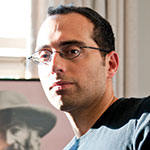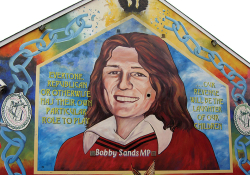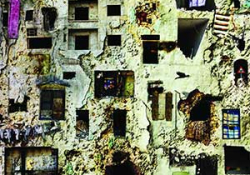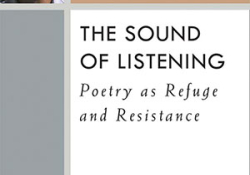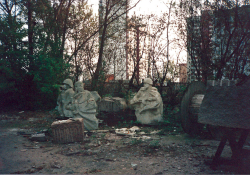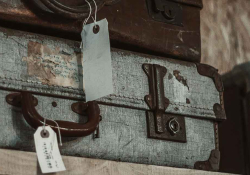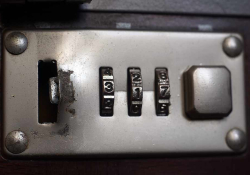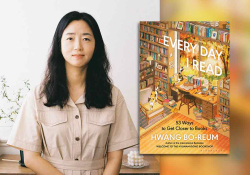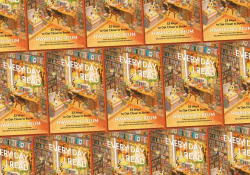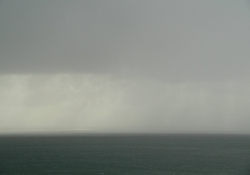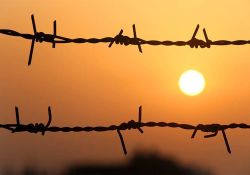Lost in the Underground Cathedral
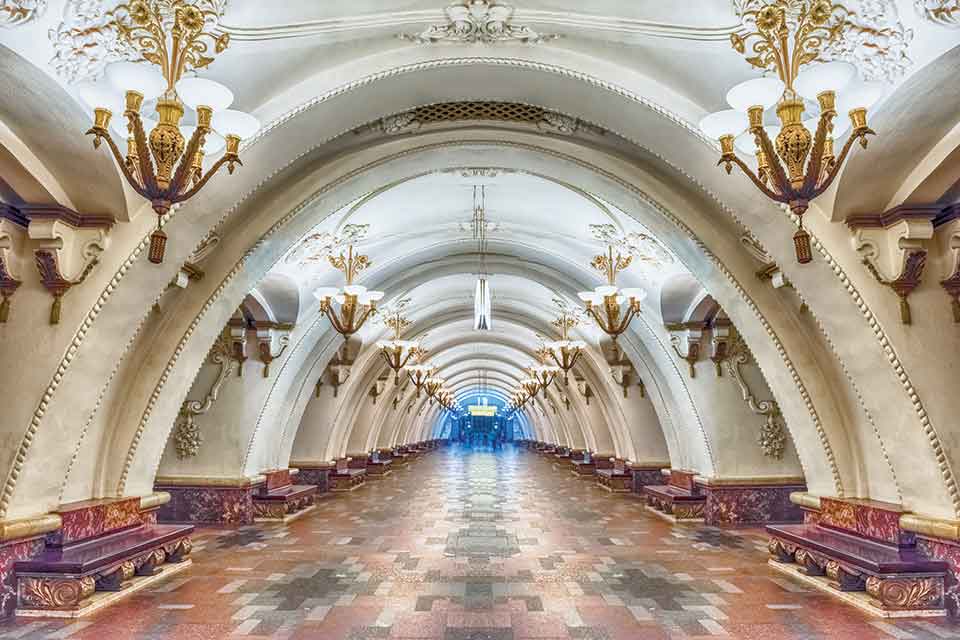
A woman sweeping the Moscow metro with a twig broom, a violinist playing a Beatles tune, and Chekhov: Philip Metres reflects on his time on fellowship in Moscow, 1992, and Soviet nostalgia.
Fweep, fweep, fweep. Like a raspy birdcall, her broom’s scraping the platform echoed in the silence between arrivals and departures of the Moscow Metro. A red kerchief wrapped up her gray hair, and her padded cotton jacket thickened her sturdy frame. She looked old enough to be someone’s grandmother, back slightly bent even when she stood up to wipe her forehead with the back of her dusty sleeve. The broom was made of twigs—actual twigs—bound by twine. That’s why I remember her thirty years later: the broom made of twigs scratching the empty platform, and her thick, stoic silence cleaning the ground far beneath the earth. With it, she stirred up a small cloud of dust.
This was her lot: to brush the dust with branches. Having lived a clean-nailed existence in the gleaming suburbs of America, I gawked at her in awe. The only summer I swept and mopped the aisles of the local grocery store, I experienced Dalí’s melting clocks as the moment of my freedom crawled backward toward some infinite horizon. When the summer was over, I vowed to find any job that would make me feel less insane.
This was her lot: to brush the dust with branches.
In the Moscow Metro, 1992, now a recent college graduate on fellowship to study poetry, I watched this grandmother trying to keep the floors clean and thought of Sisyphus. Actually, her work seemed worse than Sisyphus. At the top of his hill, at least he could wipe the sweat from his brow and see the far hills for a moment. She didn’t pause when the industrial wind began to pick up, scattering her dust, nor when the great roaring arose, nor the scream of the brakes as a train lurched into the station. Later that night in my headphones, escaping from Russia through music, I heard Bikini Kill’s “Feels Blind”—women are well acquainted with thirst—and thought again about that woman, scraping the floor with the blind fingers of a thirsty tree.
Like thousands of Metro workers, she was a vestigial servant to the old Soviet religion, cleaning its underground cathedral. Made up of four layers of train tunnels, as deep as 250 feet beneath the earth, the Moscow Metro is a city within a city, stretching over 200 miles and over 250 stations. As many as ten million people ride it every day. The stations themselves are works of art, embedded with mosaics and stained glass and sculptures, all depicting the glories of the Revolution. The most beautiful Metro stations were built in Stalin’s time, the apotheosis of the people’s architecture when millions were lost to the gulag archipelago.
Just after the fall of the Soviet Union, its underground cathedral still thrummed, but now with the tumult of commerce. But desperation fueled the crowd now that Time was Money. It made one wish for the old days, even if everyone knew that communism was botched. One day, I was hustling down a Metro passageway to meet my friend John when I heard a violin playing the Beatles’ “Yesterday.”
The song, rendered by the talented if threadbare violinist, seemed suddenly Russian. It was completely sodden with nostalgia. How strange and yet how fitting, now the Revolution had finally crumbled, to yearn for the Soviet period. So many Russians around me—not merely the weak-minded nostalgics holding signs of Stalin in front of Red Square, but decent, hard-working members of the older generation—longed for a time when things made sense, when people weren’t stealing everything that used to belong to everyone.
I wondered whether this nostalgia lingered at the core of Russian character.
I wondered whether this nostalgia lingered at the core of Russian character. After all, a century before, Chekhov’s narrator in The Steppe says: “All his new acquaintances . . . had no point in common which made them all alike: they were all people with a splendid past and a very poor present. Of the past they all—every one of them—spoke with enthusiasm, that their attitude to the present was almost one of contempt. The Russian loves recalling life, but he does not love living.” For the Russian, in Chekhov’s tale at least, the present was one of diminishment: “Now the roads were shorter, the merchants were stingier, the peasants were poorer, the bread was dearer, everything had shrunk and was on a smaller scale.”
Even if the present felt diminished, no such smaller scale was apparent in the Metro. In the dead of winter, it approached the temperature of Hades. Still frost-gnawed and shivering from the outside, I’d enter the subway car and pores of my back would open all at once, sheening me in sweat. If the ride was for more than a few stops, I would become my own Niagara Falls, hidden under layers of winter down, until I could undo my zippers and collapse on a seat to avoid passing out. All around me, Russians kept their coats on, and did not sweat, as if they were impervious to the temperature change. Or were unfazed by Hell.
I’d been socked many times by all manner of Muscovites as I pulled my way through crowds to catch a train or ascend back to earth. Was I a magnet that drew people’s ire because I looked different, or was I just one of a crowd experiencing the usual rite of passage in the greater passage from place to place in this mighty, brutal city? I was different, and though I’d wanted to erase that difference—borrowing an old dark-blue coat of Soviet make, wearing nondescript clothes, keeping my head down—I could not hide where I came from or who I was. Not once, but quite a few times, fellow passengers would stare holes at my American hiking boots—as if, if they looked hard enough, they might be able to remove them from my feet with their eyes.
O Russia and your endless escalators, dimly illumined by strange vertical lamps like huge lipstick tubes lit from within. How many times, riding down into your depths, would I cast my eye across to the rising escalator and find a pale and beautiful face framed in a scarf, and I’d fall ridiculously and absurdly in love? In the brief window between communism and capitalism, no advertisements filled the escalator caverns. There were only these faces, like closed and open books, and these bodies stilled in motion—half-human, half-statue. I was so lonely I’d long for someone to just lean against me in a packed train car, to have the sturdy and fragrant warmth of another human body pressing into mine.
There were only these faces, like closed and open books, and these bodies stilled in motion—half-human, half-statue.
After a couple of months in Russia, John and I met at Pushkin Square’s Metro stop to compare notes on our fellowship years. John was studying the Russian Orthodox Church, and finding it as complex and vexing as I was finding the poetry. At the entrance, an old woman was selling kittens snuggled in her coat, while another was selling homemade pickled cukes, pickled tomatoes, and yes, pickled pears, next to a blind pensioner with the mute pleading of his homemade sign, his fur cap open like a hungry maw. Yes, pickled pears, pears suffused in a garlicy brine—as if to say, the sweet and the sour are always married together.
“I can’t fall asleep,” I confessed. “And when I wake up, my head feels so heavy, I can barely lift it. Maybe it’s culture shock.”
To say “culture shock” didn’t make my feelings any more understandable or the world any more explainable. I arrived in Russia with barely rudimentary Russian, knowing no one, landing in a country enduring the worst inflation it had ever seen, the shock of capitalism overwhelming everyone and everything. The whole society teetered on a bridge between zombie communism and vicious capitalism, and everyone struggled to stay on their feet. My problems were prosaic in the extreme, once the nimbus of awe at this mysterious country wore off, and I was left with pickled pears and the inability to strike two words together to explain myself to anyone else. I couldn’t take the blind pensioner, the legless veteran, and the drunk marinating in his own urine. And the fact that everyone, including me, passed by without a thought—or worse, pushed past anyone pausing to consider what one should do about the individual examples of human misery.
“Been there,” John said, looking at the Metro crowd bundling down the stairs, eyes averted from the blind man. “I don’t want to live like a Russian again.”
He described his junior year here, his eyes staring into a distance that contained a past I could not see. He shook his blond head, as if to send the thoughts—like invisible horseflies biting him—into flight.
I envied him. Since he’d been here before, he knew what he’d be facing. His Russian was very good, and even when he made mistakes, he didn’t get flustered and lose the thread of conversation in the heat of his shame, as I would. And more than that. During his previous visit, he’d fallen for a Russian girl. Apparently, she’d gotten the better of him, cored his heart and left him to die. He felt burned, and rightfully so. But after a string of dead-end first dates during my senior year of college, I saw it as real life. He had passed from the kingdom of romance, through the country of lovemaking, and down into the valley of heartbreak.
“There’s an animalism in people here,” he said as we walked, harassed by street vendors and the pensioner I saw almost every day, a man without sight who, nonetheless, I swear could see right through me. Everyone hustle-bustled by us, slowed by our talking.
“But you’re looking at the situation as an American,” I said. “They have little choice. They’re trying to survive, to live day-to-day.”
“Maybe,” he said. “But that’s not how I want to live.”
John’s vehemence scared me. I understood where he was coming from, but I just didn’t want to believe it. Russians were not animals, just people struggling against an inhumane situation. They were simply trying to scrape together some small existence. To stop for every diorama of human suffering would be to turn into a pillar of salt forever.
I tried to fight it in myself, that desire to get some distance from this society and judge these people as inhuman. After all, I came because I wanted to witness life here from the inside, not to cast judgments from a distance. But to live like a Russian, to endure the daily indignities without complaint, seemed beyond me. I was too soft, too permeable, too used to ease.
John stopped at a track-suited unshaven guy, a low-level mafia type offering to change hard currency into rubles. The rate was better than the bank’s, so John handed over his cash.
Adidas guy counted out the rubles, folded in half, and handed them to John, slipping back into the crowd.
At the Pizza Hut window, John pulled out his rubles. Looking perplexed, he counted again.
“What the fuck!”
“What?” I said.
“That bastard shortchanged me. This. Fucking. Country,” he said, flailing his arms around him.
After our slices, which we ate in silence, we said goodbye at the mouth of the Metro, where people laden with bags dragged along and staggered, as if barely alive. I had seen it, and had begun to feel it in my own skin—how living close to survival leads to callousness and cruelty, a hardness that is equal parts anger and hopelessness.
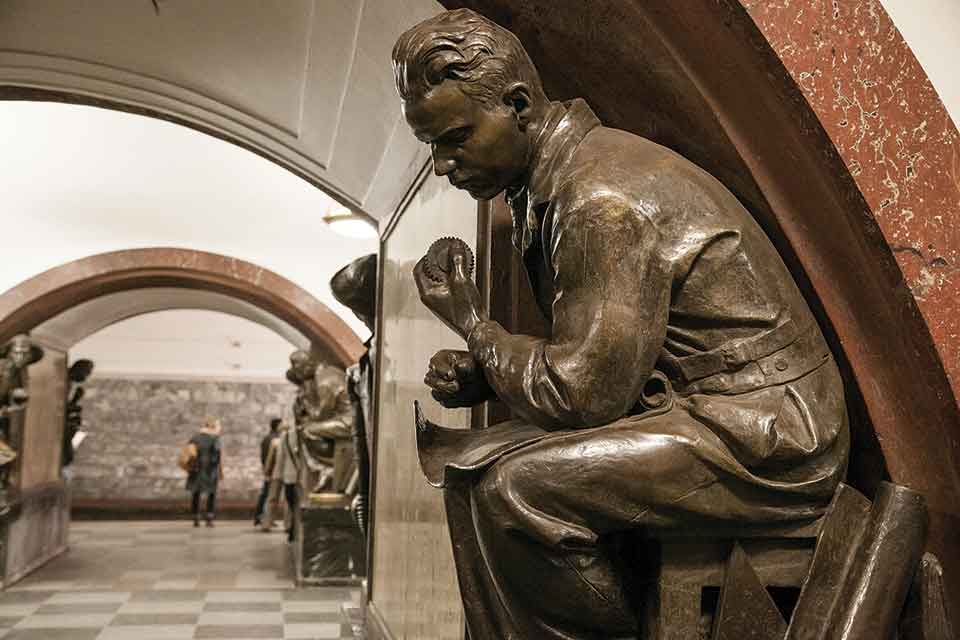
A few months later on a frozen train platform, I was trying to procure tickets for my family and me to head back into Moscow from Zagorsk, where we’d witnessed the sublime gold-filled churches of Sergiyev Posad and its testy beggars outside. We were beyond cold, somewhere in the early stages of numbness, and the cashier inside behind the tiny metal grate—warm and indifferent, an apathetic goddess—could not hide her secret delight that we had missed the last train. That she could not help me. That she could turn back to her own more important affairs. As if we were playing poker, and her face was shining with pleasure at her hand. A hand that would ruin my day, if not my whole life.
A fury rose up inside me.
“I’m not an animal, I’m a human being,” I retorted angrily, causing the usually apathetic train station crowd to turn and gawk in alarm. I pushed to the window of a second ticket agent and negotiated tickets for another train.
My mother stood back in wonder at what had happened to me—her shy and self-abnegating son throwing a public fit.
Down in the Metro again, passing the old woman and her broom, the passageway down was so packed with people that we had to take small steps just to move forward. Hundreds of people with no space, inching along. It was funny for a minute, and then it was terrifying. One person who lost their cool could risk causing a panic, a human stampede. You didn’t have to be a claustrophobic to feel like you couldn’t breathe. But you did breathe, you had to remind yourself to breathe, and you breathed, swaying forward, not hurtling into or hurting each other. You lugged yourself and everyone else, as if we were barge haulers lugging some enormous but invisible weight behind them, neither joking nor restraining against the impossibility of the situation. And in the middle of this ignominy, a silence spread over the passageway, passing like a mute wave over us, washing us in its wordlessness. I tried to peer over the heads of those in front of me, hoping to see a break in the human ocean, but it was just people as far as I could see, each of us taking our tiny steps in this underground cathedral, making the halting hip-sway of those plodding in line up a church aisle, waiting for a cardboard wafer that we wanted to believe was the body of God.
Outside the Metro, back on earth, the day now draining away the sky, I couldn’t believe how light and free I felt. And how lost. I looked up and down the strange street, uncertain of my direction. A spry but elderly woman stopped her quick pace, noticing my confused glances this way and that. The library? The library, yes, she said, the library, she said, I love to read, she said, holding my arm and talking to me like a child, slowly and kindly as she guided me along. It is good to get lost in a book, she said, when everything else is hard. I nodded. Like a good grandson, I carried her bag, laden with potatoes, the wild tops of carrots peeking out. She could have been my grandmother, nudging me onward through the confusing streets, finding words to calm me down and to build me up. Such sudden kindness greening forth—as if she’d sensed that I was an outsider, a mere child, but that I had been among her kind, hauling the weight like it was mine.
University Heights, Ohio

